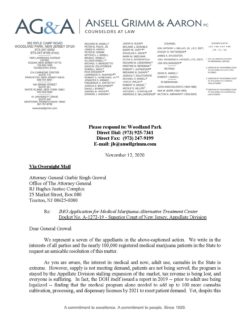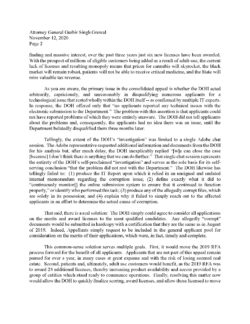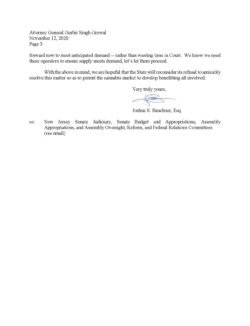NJ Pot Advocates Say License Caps Could Shape Industry – By Diana Novak Jones
Law360 (December 23, 2020, 4:39 PM EST) — As legislation framing the new adult-use marijuana market in New Jersey awaits the governor’s signature, advocates say one of the most consequential decisions for what could be the industry’s most lucrative state has yet to be made.
New Jersey’s proximity to New York and Pennsylvania — two populous states without legal recreational marijuana — will mean its adult-use marijuana businesses could have near-exclusive access to one of the most densely populated parts of the country.
Legislators have drafted the first rules for the industry, and they already include a restriction on the number of cultivators. If Gov. Phil Murphy signs off, the process will move into regulators’ hands. It’s there that the competition could ramp up, depending on whether the Cannabis Regulatory Commission decides to limit the number of dispensaries and other marijuana businesses.
If they do, the fight could be just getting started, advocates say.
Joshua Bauchner, head of the cannabis practice group at New Jersey law firm Ansell Grimm & Aaron PC, pointed to the “green trail,” a reference to Interstate 91, as evidence people will travel for marijuana.
New Yorkers drive between two and three hours on the interstate to reach Massachusetts, where they can access recreational marijuana dispensaries, Bauchner told Law360. Soon, they’ll instead be able to ride a New Jersey transit train for 15 minutes, he said.
And if regulators decide to put caps on dispensary licenses, “the few operators that are lucky enough to get a license will basically have monopolistic power,” he said.
A Sticking Point
A key feature of many states’ forays into recreational marijuana has been to cap the number of licenses issued, and New Jersey has been no exception so far.
Caps on cultivation were among the hotly debated elements of New Jersey’s recreational pot legislation, spurred by concerns about controlling the amount of product available, according to Harris Laufer, the legislative director for New Jersey State Sen. Nick Scutari, D-Union County, who led the push for the bills. The legislation that passed New Jersey’s Legislature on Dec. 17 came with a cap of 37 cultivation licenses.
Scutari has been working toward legalizing recreational pot since he joined the Legislature in 2004, in a process that has been repeatedly stymied by reluctant lawmakers. He said it would not have happened this year without voters’ clear support on the measure.
“If that didn’t happen, I can think of a few legislators that would not have voted for it,” Scutari said.
Scutari prefers a free-market approach, but the cap on cultivators was a critical part of the negotiations to get the deal on the legislation done, Laufer said. And the cap, which expires after two years, covers both medical and recreational cultivators, so many of the licenses are already claimed.
Scutari said he worked with the governor’s office to craft this legislation, so he is confident it will get Murphy’s signature.
But with the restriction on cultivators in place, many in the industry are wondering whether more limits are on the way.
Once Murphy approves the legislation, the rest of the state’s pot regulations will be drafted by the Cannabis Regulatory Commission. Murphy has been selecting the commission’s members since earlier in fall.
The licensing process needs to be put together, then the licenses need to be awarded, Scutari said.
“There’s a lot to that,” he said, predicting it will be at least six months before the licenses go out.
Cap Concerns
The Garden State’s potential as a new marijuana market has many in the industry worried about caps on businesses like dispensaries and producers, and what that could mean for businesses hoping to get a foothold.
Nothing is finalized yet, but advocates for different groups say limits on licenses could leave a lot of people out of the burgeoning industry. And once the legislation is signed, it will be up to the Cannabis Regulatory Commission to decide whether to include them.
Representatives for Murphy declined to comment or make the newly chosen head of the commission, Dianna Houenou, available to speak about the coming regulations.
One group concerned about the use of caps are those behind the ballot measure that legalized marijuana.
Amol Sinha, executive director of the American Civil Liberties Union’s New Jersey chapter and chairman of the ballot measure initiative, NJ CAN 2020, said caps are a problem when it comes to the group’s goal of improving access to the industry for people impacted by the war on drugs.
“They eliminate competition, they artificially keep the price of cannabis high,” Sinha told Law360.
Caps “make it hard for everyday people to obtain a license. Only the people who are already set up are going to get those, and usually those are big operators,” Sinha said.
Sinha applauded a part of the legislation that sets aside 70% of the sales tax and additional fees from legal marijuana for impact zones, which he said were largely minority communities across New Jersey. The ACLU put its weight behind that measure after initial proposals had the bulk of the money going to law enforcement, he said.
But the legislation doesn’t have a plan to set aside licenses for equity applicants, or people disproportionately hurt by marijuana prohibition, he said. That will also be up to the regulators, Sinha said.
Another person watching to see what happens with the regulations is Bauchner, who is representing several would-be medical marijuana operators in two separate and ongoing lawsuits over New Jersey’s medical marijuana licensing process.
The lawsuits target the New Jersey Department of Health, which oversees medical marijuana, deciding how many dispensaries the state will have and who gets them. Bauchner says the regulators for recreational marijuana should expect competition for the licenses to be fierce.
“If past is prologue, everyone is going to be interested in the adult-use market,” he said.
If caps are put in place, there will likely be more litigation, Bauchner added. And he thinks caps are likely, given their political support.
“We’re likely to see, as we have in the past, hundreds of applications,” he said. “The problem then becomes qualified applicants are being denied the right to pursue that option because of an arbitrary cap.”
Limits will likely also have the backing of major marijuana companies, which are already present in the state’s medical industry, Bauchner said.
If regulators rely on caps, “they’ve created a system where the stakes are so high, it engenders litigation and it permits monopolistic conduct,” he said. “It’s going to yield problems.”
–Additional reporting by Bill Wichert. Editing by Nicole Bleier.




